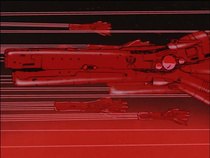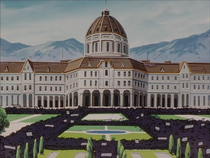User:Goldenbaum Loyalist/Sandbox
From Gineipaedia, the Legend of Galactic Heroes wiki
(→The Emperor's Abduction) |
(→Prime minister) |
||
| Line 147: | Line 147: | ||
===The Emperor's Abduction=== | ===The Emperor's Abduction=== | ||
| - | [[File:Kaiserine Catherine coronation.png|thumb|210px|Prime Minister Lohengramm announcing the coronation of Empress Catherine ({{d|798|uc}})]] | + | [[File:Kaiserine Catherine coronation.png|thumb|210px|left|Prime Minister Lohengramm announcing the coronation of Empress Catherine ({{d|798|uc}})]] |
With the loss of the Geiersburg Fortress and the [[Kempff Fleet]] last spring, the Imperial public was largely against the idea of any further extended warfare, to Reinhard's annoyance. But the Fezzani plan that had been put in motion would culminate during the summer of {{d|798|uc}} and make another confrontation inevitable. In June, the Prime Minister is informed by the Military Police chief Ulrich Kesler that Landsberg and Schumacher arrived on the Imperial capital with Fezzani passports. He orders them to be tracked and after some discussions with his secretary, Hildegarde von Mariendorf, he summons Fezzan's ambassador on Odin, [[Nicholas Boltik]]. Reinhard deduced the essence of the Fezzani plot to kidnap the child Kaiser, and essentially made a deal to go along with their plan to help him conquer the Alliance, with the kidnapping and the government-in-exile that would be created providing the necessary ''casus belli''. Both men left the discussion being convinced that they were successfully using each other, although Boltik did not surmise the extent of Reinhard's own plan, which was to use the demilitarized Fezzan Corridor to take the Alliance by surprise and avoid attacking Iserlohn. Boltik said he would ask his government about it, but Reinhard secretly made up his mind to seize control of it forcefully. ({{logh|036}}) | With the loss of the Geiersburg Fortress and the [[Kempff Fleet]] last spring, the Imperial public was largely against the idea of any further extended warfare, to Reinhard's annoyance. But the Fezzani plan that had been put in motion would culminate during the summer of {{d|798|uc}} and make another confrontation inevitable. In June, the Prime Minister is informed by the Military Police chief Ulrich Kesler that Landsberg and Schumacher arrived on the Imperial capital with Fezzani passports. He orders them to be tracked and after some discussions with his secretary, Hildegarde von Mariendorf, he summons Fezzan's ambassador on Odin, [[Nicholas Boltik]]. Reinhard deduced the essence of the Fezzani plot to kidnap the child Kaiser, and essentially made a deal to go along with their plan to help him conquer the Alliance, with the kidnapping and the government-in-exile that would be created providing the necessary ''casus belli''. Both men left the discussion being convinced that they were successfully using each other, although Boltik did not surmise the extent of Reinhard's own plan, which was to use the demilitarized Fezzan Corridor to take the Alliance by surprise and avoid attacking Iserlohn. Boltik said he would ask his government about it, but Reinhard secretly made up his mind to seize control of it forcefully. ({{logh|036}}) | ||
Revision as of 17:55, 6 October 2017
I will work on big projects here.
 Kaiser Reinhard (801 UC (3 NIC / 492 IC / 3601 CE)) | |
| Gender: | Male |
| Affiliation: | Galactic Empire |
| Rank: | Supreme Fleet Admiral |
| Flagship(s): | Brünhild Tannhäuser (former) |
| Occupation: | Kaiser of the Galactic Empire |
| Status: | Deceased (natural causes) |
| Born: | 776 UC (467 IC / 3576 CE) |
| Died: | 801 UC (3 NIC / 492 IC / 3601 CE) |
| Played by: | Horikawa Ryō (MCISS, OVA, ONW) Narahashi Miki (OVA, childhood) Midorikawa Hikaru (GW) |
Reinhard von Lohengramm (Japanese: ラインハルト・フォン・ローエングラム), born Reinhard von Müsel, was an Imperial military and political leader who rose to prominence during the Alliance–Imperial War, overthrowing the ruling Goldenbaum Dynasty and establishing himself as the new Kaiser. A genius in war and politics, he rose to the highest ranks of the Imperial Fleet at a young age and eventually usurped the power of the traditional nobility during the Imperial Civil War. Upon becoming the de facto dictator of the Empire, he instituted numerous political, legal, economic, and social reforms to abolish the old feudalistic system that had existed under the Goldenbaums and created a new state, which was described by Yang Wen-li as having been "Not by the people, but for the people." Shortly after his conquest of the Free Planets Alliance, he deposed the last Goldenbaum sovereign, who was essentially powerless, from the throne and proclaimed himself emperor.
He died on 26 July 801 UC (3 NIC / 492 IC / 3601 CE), at the age of 25, after having become arguably the most influential leader in human history and having unified humanity under the rule of one government.
Contents[hide] |
Early life

Born on 14 March 776 UC (467 IC / 3576 CE) to the poor aristocratic von Müsel family, Reinhard spent most of his childhood living with his father, Sebastian, and sister, Annerose, in a middle-class, suburban neighbourhood. Because Reinhard's mother, Caribelle, died in a car accident when he was very young, Reinhard grew very attached to his older sister. The von Müsel family held the noble rank of Reichsritter (Imperial Knight) therefore barely qualifying as a noble. As a child, Reinhard met the man whom he would later declare another part of himself: Siegfried Kircheis. The young Reinhard felt the name "Siegfried" was too common, and insisted on calling Siegfried by his surname, Kircheis. He would retain his habit of using Kircheis' surname, despite their close relationship, for the rest of his life. In many ways, Reinhard's life was defined by the strong relationships he formed with his sister and friend in those happy days. (LOGH: 'Empire's Afterglow', Golden Wings)
Unfortunately, those days were not to last and Reinhard was rudely exposed to the true nature of the Galactic Empire's class system in 786 UC (477 IC / 3586 CE). One day, a high nobleman happened to see Reinhard's sister Annerose in the street, and took notice of her. Shortly thereafter, rumours of her exceptional beauty reached the Imperial Court. It was then decided that she would be brought to the Imperial Palace to serve as an imperial consort to the emperor—Kaiser Friedrich IV. Reinhard's father accepted a large sum of money as a dowry in exchange for effectively selling his daughter into a life of sexual servitude. He chose to accept the money, because he reasoned that even if he refused the payment Annerose would be taken away regardless. Already weak to alcohol since the death of his wife, Sebastian retreated further into the bottle after Annerose was taken. Reflecting on Sebastian's life after his death, Kircheis thought perhaps he was never able to forgive himself for failing to protect his daughter. (DMSN: 'Chapter III')
When Reinhard realised what his father had done, he was enraged. He angrily swore to destroy the corrupt, capricious Goldenbaum Dynasty and rescue his sister from the clutches of Kaiser Friedrich IV. Together, he and Kircheis promised to defeat every enemy and win every battle in pursuit of that goal. Julian Mintz would later note that Annerose served as the catalyst that resulted in the great change of history that Reinhard accomplished. Shortly after his sister was taken, Reinhard joined military school to become an officer, as he considered it the fastest way to advance in their class-based society, getting Kircheis to go along with him. (LOGH: 'Empire's Afterglow', 'Dream: To See It to the End', SWV: 'Chapter I')
Early military career
Kapche-Lanka

Reinhard graduated from the Imperial Officer Academy on Odin at the top of his class, and though he was much resented by his upperclassmen, all of his peers and underclassmen respected and admired him. Immediately after graduating, Reinhard and Kircheis, as young junior officers, were assigned to an Imperial facility on the frozen world of Kapche-Lanka, located within the Iserlohn Corridor on the front line of the Alliance–Imperial War. It was a minor world that had some natural resources, but was not of much significance, with combat there going on mainly due to the fact that neither the Empire nor the Alliance wanted the other side to take control of it. Reinhard viewed it as an example of the incompetence of the leadership on both sides. He earned the ire of the commanding officer, Captain Herder, after getting into a fight with some lower ranking servicemen that were abusing a civilian woman. However, Reinhard's situation would become more perilous when Marquise Sussanna von Beenemünde, a concubine of Kaiser Friedrich who despised his sister's status at court, secretly hired the captain to assassinate Reinhard. He and Kircheis are thus sent on what is ostensibly a recon mission into the frozen wastes of Kapche-Lanka, but with an ill-equipped tank. (SWV: 'Chapter I', 'Chapter II')
They inevitably run low on fuel and decide to attack an Alliance tank patrol that they stumble across to obtain more supplies. After successfully ambushing them, the pair gained not only more fuel but information on an upcoming Alliance attack on the Imperial base. Meanwhile, Reinhard correctly assumes that Captain Herder will send a subordinate to check on whether or not they are still alive, and lays a trap for him. When Lieutenant Fugenberch arrives and reveals what is really going on before intending to finish off Reinhard, Kircheis fires from the tank nearby and kills the lieutenant. Following his death, Reinhard and Kircheis returned to the base to find it is under attack by the Alliance already, at which point they use a code they obtained from the enemy tank they captured to shut down the Alliance's attacking tanks, allowing the Empire to counterattack. Subsequently, feigning ignorance of Captain Herder's plot against them, they take part in his assault on the Alliance base, and during that assault Herder attempts to murder Reinhard. However, they prepared for it and stopped him, though in the end Herder committed suicide. (SWV: 'Chapter III', 'Chapter IV')
Unfortunately, both conspirators on Kapche-Lanka died, making any possible legal action against Marquise von Beenemünde impossible. Following his victories, Reinhard was promoted to Sub-lieutenant and transferred to the space fleet. (SWV: 'Chapter IV')
Hameln II
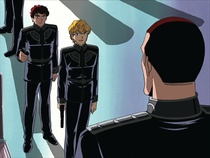
Following the events on Kapche-Lanka, in August of 791 UC (482 IC / 3591 CE), Reinhard was assigned as Chief Navigator aboard the destroyer Hameln II. Although the ship's captain is impressed with Reinhard's service record, the rest of the crew is less enthusiastic and sees him as a spoiled aristocratic brat who got promoted because of his sister's status with the Kaiser. However, while going outside the vessel on a space walk, an enlisted rating ended up getting disconnected from the ship and flying out into space, before Reinhard rescued him. This earned the young officer respect from the enlisted crew of the Hameln II. Later during a routine patrol outside of Iserlohn, their squadron is attacked and Reinhard temporarily takes command of the vessel when the captain is severely injured and the first officer, Lieutenant Hartmann Bertram, happens to not be on the bridge. Reinhard led the destroyer away from the rest of their squadron, which fled from the Alliance vessels that were waiting to ambush them in a nearby asteroid field. Instead he flew into the asteroid field, predicting the Alliance ships wouldn't follow them and instead hunt for the fleeing squadron. Bertram returned and later demanded he pass command authority back to him and return to the normal course, but Reinhard's prediction is confirmed when the rest of their squadron is destroyed. (MUT: 'Chapter I', 'Chapter II')
Bertram orders the detainment of Reinhard on the grounds of mutiny, which Kircheis (the Security Officer) carries out. As they hide in the asteroid field from the patrolling Alliance ships, Bertram decided to self-destruct the ship as he believed there is not way of escape. He ignored fellow crewman Schmidt's proposal to use the energy dispensed by a solar eruption from a nearby star to propel their ship away from the Alliance squadron in the area. Kircheis became aware of both the proposal and Bertram's plan to self-destruct, and decided to free Reinhard with the help of some enlisted men. Together they took control of the bridge but were confronted by Bertram, who shot an enlisted crewman defending Reinhard. The situation would have escalated if not for the arrival of Lt Commander Adenauer, their captain, who repeats his order giving Reinhard command authority. They proceeded with the plan to get away using the eruption from the nearby star, and despite some minor problems that resulted in Bertram's death after volunteering for a dangerous mission to atone for having shot a crewman, they are able to escape. (MUT: 'Chapter III', 'Chapter IV')
After their return to Iserlohn, Reinhard was recommended by Adenauer for promotion to lieutenant. Given the choice between continuing on as the new executive officer and an assignment elsewhere, Reinhard opted for assignment elsewhere to broaden his experience. (MUT: 'Chapter IV')
Military administration

While working a desk job at the investigative department of the Ministry of Military Affairs on Odin, Reinhard discovered several instances of corruption among base commanders on the front line. The amounts of supplies ordered and those received by the front line units do not correlate, and Reinhard deduces that certain officers were siphoning off military supplies to sell on the black market. He and Kircheis gathered evidence and reported to their superiors, but were told that nothing could be done: a certain amount of corruption was accepted as a "necessary evil" and they were essentially ordered to drop the matter. This further solidified Reinhard's opinion that the Goldenbaum Dynasty was too corrupt to be allowed to continue. (DUEL: 'Chapter I')
However, the posting at the Imperial Capital meant that he was able to meet with his sister Annerose. During one such occasion, he found out about the dispute between one of her sister's few allies at the Imperial court, Viscountess Dorothea von Schaffhausen, and Count Herxheimer, relative of one of the most influential high nobles of the Empire: Marquis Wilhelm von Littenheim, over territorial mining rights. Herxheimer knew he had no chance of winning the case against her in a court of law and challenged her to a duel, using his reputation to ensure that no professional duelist would work for the Schaffhausen family. When Reinhard heard of this, he offered to take the place of her duelist, despite having no experience in that arena. News of the "blond brat" choosing to participate in this high-level duel spread quickly throughout the upper echelons of Imperial society and soon the event became a spectacle. Reinhard learned to use the antique flintlock pistols traditionally wielded by duelists, initially struggling before happening to run into a young lieutenant commander, Cornelius Lutz, who trained him in its use. Unbeknownst to Reinhard, Marquise von Beenemüde (having failed to get Reinhard killed on Kapche-Lanka) hired an assassin to take the place of Count Herxheimer's duelist, in order to kill Reinhard during the duel. (DUEL: 'Chapter I', 'Chapter II')
The duel was held on a property owned by Marquis Littenheim, who supported the Count, and was viewed by a large audience of nobles. Both the assassin and Reinhard missed each other in the first round because the latter duelist chose to leap to the side. In the second round, both of them wounded each other, in the assassin's right shoulder and Reinhard's left arm. The third round was a sword match, at the request of the assassin, who quickly proves himself to be the superior swordsman despite his injury, but before Reinhard could be defeated a group of Imperial Guardsmen arrived at the arena on horseback, telling them that Kaiser Friedrich IV had ordered the duel to be suspended and had settled the dispute personally, splitting the proceeds of the mines equally between the two feuding families. The outcome pleased the Schaffhausen family while Herxheimer reluctantly accepted the Emperor's settlement. The assassin challenged Reinhard to another duel privately, and Reinhard, with assistance from Kircheis, is able to defeat him the second time, once again foiling Beenemüde's attempt to kill him. (DUEL: 'Chapter III', 'Chapter IV')
Hässliche Entlein
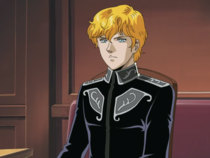
Later in 792 UC (483 IC / 3592 CE), Reinhard was transferred to Iserlohn Fortress on the front line, being given command of the destroyer Ermland II. He spent part of his time there under investigation by a lieutenant commander named Gregor von Krumbach, who was sent to Iserlohn to investigate the death of Captain Herder back on Kapche-Lanka. Secretly, however, he was sent there with the goal of killing Reinhard, one behalf of Marquise von Beenemüde. Krumbach was unable to find an opportunity to do so when an Alliance expeditionary fleet attacked the fortress, at which point he joined Reinhard and Kircheis aboard the Ermland II. During the battle Ermland II destroyed an Alliance cruiser, and for that he was later promoted to commander. After the battle Reinhard and Kircheis confronted Krumbach, killing him. (Golden Wings)
In December of the same year, Commander von Müsel took command of the Imperial cruiser Hässliche Entlein ("Ugly Duckling"). It was here that he encountered August Samuel Wahlen who was his executive officer. As the captain of a cruiser, Reinhard drilled his crew frequently while they were not in battle, keeping the ship at combat readiness and the highest levels of efficiency. Around that time, he was chosen, along with the crew of his ship, for a special mission behind enemy lines by Imperial military intelligence. It was to intercept Count Herxheimer and prevent him from defecting to the Free Planets Alliance with the stolen directional Seffle particles prototype. Due to the secrecy of the mission, they could expect no support from other Imperial units and to be operating in enemy territory. Reinhard accepted the operation, being joined by a representative of intelligence, Lieutenant Commander Bendling. (RET: 'Chapter I')
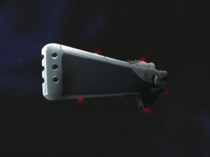
After organizing a skirmish between Imperial and Alliance border patrol ships in the Iserlohn Corridor to distract them, Hässliche Entlein was able to pass into the Alliance side of the Corridor undetected. The cruiser then skirted the edge of Alliance space in an uneventful southward journey to Fezzan Corridor, where it caught Count Herxheimer's vessel and boarded it. In the process, they received valuable intelligence from Sub-lieutenant Neidhart Müller, then the military attaché at the Imperial diplomatic mission on Fezzan. He and most of his family were killed in a decompression accident aboard the ship, except for his daughter, who was taken aboard Hässliche Entlein. Along with the Count's ship and the prototype generator aboard it—which they could not bring onto their own vessel as it was digitally locked onto his ship—the cruiser then evaded an Alliance patrol squadron while en route back to the Empire. They were able to use the generator to a limited extent, and even in that state it was enough to destroy the pursuing Alliance squadron. After that, Kircheis proposed that they make a deal to get the unlock code to the generator from the Count's daughter in exchange for her being able to defect to the Free Planets Alliance, to which she agreed. (RET: 'Chapter II', 'Chapter III')
However, not only did the unlock code give access to the Seffle particle generator, but to secret information surrounding Count Herxheimer's attempted defection. The Count had learned that Duke Otto von Braunschweig's daughter had inherited a genetic disease from her mother, meaning that Marquis Littenheim's daughter did as well, considering that their wives were sisters. That made them both ineligible claimants for the Imperial throne by the Inferior Genes Exclusion Act. Thus Littenheim tried to have him killed to suppress knowledge of that fact, prompting his defection. Reinhard and Kircheis were the only others, besides intelligence officer Bendling (who chose to defect to the Alliance with the Count's daughter), who were aware of the information. A short while later, Hässliche Entlein was able to return to Iserlohn Fortress after using the Seffle particle generator to break through an Alliance blockade and receiving supplies from supply ships led by Ernst von Eisenach. (RET: 'Chapter IV')
Imperial Military Police
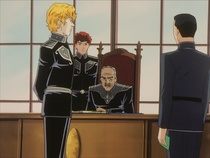
Following the success of their operation, Reinhard received a promotion and transfer from the Hässliche Entlein back to Odin, where he visited his alma mater, the War Academy. As a seventeen-year old captain, he naturally was respected and admired by most of the cadets. After observing the school for a day Reinhard and Kircheis received their new assignment in the Imperial Military Police. Reinhard was annoyed by this as it would not give him the opportunity to distinguish himself and get a promotion, to which Kircheis reminded him it would be valuable to know how the MPs worked and that out of the Goldenbaum Dynasty's institutions, the Military Police was one that needed reform the most. It was during this time that Reinhard first learned of Ulrich Kesler, a Fleet officer who transferred to the Military Police as an observer, and his efforts to try to keep the MPs from severely punishing a woman for lèse-majesté, only for all of his work to have ultimately been in vain. It again incited Reinhard to go on a rant about the degenerate state of the Empire before he was interrupted by a call from the chief of police to receive his new orders: go back to the school to investigate a murder that took place the night before. (DMSN: 'Chapter I')
A cadet named Karl von Reifeisen had been found murdered. Reinhard and Kircheis then investigated the matter, briefly interrupted by the death of his father Sebastian von Müsel. A second murder was later committed, of cadet Johann Gottholp von Bertz. Although Kircheis noted that Reinhard did not have to become an expert in everything, the two were able to solve the case, despite Reinhard's initial lack of interest in the assignment. In the process of the investigation they discovered that Reifeisen's death was an accident, but the school principal Gerhard von Steger, the first to find his body, attempted to make it look like a murder both to prevent any accusations of negligence on his part, and to assist his grandson, who was third in the class. Bertz was the second in their class, and Steger killed him to remove an obstacle and to implicate Moritz von Haase, at the top of the class, as the killer. Reinhard and Kircheis confronted Steger and explained the results of their investigation to him, taking him into custody shortly afterwards. Haase, who they discovered was color-blind and lied about this defect to get into military school, was also taken away, against Reinhard's wishes, who again saw it as an example of the folly of Kaiser Rudolf the Great's policies; since this cadet with a genetic problem had been at the top of his class in military school. (DMSN: 'Chapter II', 'Chapter III', 'Chapter IV')
Fleet command
Having been promoted to commodore, the eighteen-year old Reinhard commanded a small squadron of the elderly Vice Admiral Richard von Grimmelshausen's fleet at the Battle of Van-Fleet in March 794 UC (485 IC / 3594 CE). The battle was viewed by Reinhard as completely useless and strategically insignificant, and initially Reinhard's squadron was placed in reserve along with the rest of the Grimmelshausen Fleet, much to the young commodore's frustration. The Imperial commander-in-chief, Gregor von Mückenberger, saw the old admiral as a liability and sent his force to the fourth planet orbiting Van-Fleet, Van Fleet 4-2. Unbeknownst to the Imperials, an Alliance rear support supply base had been constructed on the planet. Reinhard voiced this possibility to Grimmelshausen and offered to lead the recon team on the ground, but Commodore Hermann von Lüneburg—an officer who specialized in ground warfare—asked to take command. The entire fleet proceeds to land on the surface, with Reinhard remaining aboard his flagship initially before taking part in an assault on the Alliance facility as the vice commander, below Lüneburg. This frustrates him as well, both because they are the same rank and the man's condescending attitude. It was the beginning of the rivalry between the two. (HBSHBL: 'The Battle of Van-Fleet Starzone', 'Drei Rot', 'Bloodshed in April')
Over the course of the battle, Reinhard and Kircheis entered the Alliance base with Imperial forces and personally captured the base commander, Vice Admiral Sinclair Cerebrese. As a result, Reinhard and Lüneburg were both promoted to rear admiral while Grimmelshausen was made a full admiral. Back on Odin after the engagement, the young flag officer had Kircheis check Lüneburg's background, and also visited Annerose once again, where he complained about Kircheis being refused a promotion. This changed soon after when Admiral Grimmelshausen recommended Reinhard's redheaded friend for a promotion. Not long after that Reinhard and Kircheis heard about a rumor spreading through the Imperial court which stated that Kaiser Friedrich IV planned to bestow upon Reinhard a new title, the Countship of Lohengramm, on his twentieth birthday. Reinhard uncharacteristically reacted positively to the suggestion. Reinhard later visited a party hosted by Grimmelshausen that celebrated his promotion to admiral, which included among its guest list, Lüneburg, with whom he nearly got into a fistfight with after Luneburg accused Reinhard of impropriety with his wife. (HBSHBL: 'Chronicle of the Aftermath of the Chaotic War', 'The Hard Wind of Early Summer', 'Candidate for Succeeding a Count's Family')
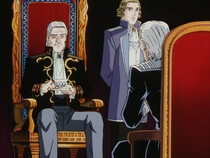
Later in the year both officers returned to the front lines for the Sixth Battle of Iserlohn. In the early part of the campaign Reinhard amassed several victories during the initial skirmishes ahead of the Alliance main fleet's arrival for the assault on Iserlohn, but received little attention from his superiors. The Free Planets Star Fleet, however, became aware that there was a capable Imperial fleet commander at work who had handed them several stinging defeats and made attempts to entrap him using a plan developed by Yang. Outnumbered ten to one, Reinhard lost a third of his fleet breaking out of the trap. Later the Alliance completed its full deployment and began the Sixth Battle of Iserlohn proper. During the main engagement Reinhard's fleet was held in reserve. When Iserlohn Fortress was under dangerous bombardment by Alliance missile ships he launched an attack without orders, driving them away. He then seized the initiative and struck the Alliance flank, forcing them to counterattack on a narrow front where their numbers could not overwhelm his much smaller force. Rushing to join the battle, other Imperial fleets blocked the fire of Thor's Hammer and the battle became a melee (as Reinhard had predicted). (HBSHBL: 'Truth Is the Daughter of Time', 'The Sixth Battle of Iserlohn')
Reinhard's rival Lüneburg was killed leading a boarding action during this phase of the fighting. Meanwhile, while his squadron was being resupplied in Iserlohn Fortress, Reinhard met with Ulrich Kesler, who explained that Grimmelshausen sent him his memoirs which included information he had learned from various high nobles over the years, including incriminating, secretive information. However, Reinhard declined and asked Kesler to keep the Grimmelshausen's book with the information, to be made public when the nobility of the Empire "are no longer in power." The blond rear admiral did not want to resort to blackmail to further his career. Meanwhile, back on the battlefield, Reinhard proposed to Mückenberger a plan to end the stalemate: to block the other end of the Iserlohn Corridor, which would make them break off the attack or be trapped and destroyed. Reinhard was appointed to command this force and the Alliance Star Fleet took the bait, following him and trying to withdraw from Iserlohn. The disengage Imperial Fleet then retreated as well, allowing the Thor Hammer superlaser to be used against the retreating Alliance ships to a decisive effect. (HBSHBL: 'The Sixth Battle of Iserlohn', 'A Hundred Billion Stars, One Ambition')
The Third Battle of Tiamat
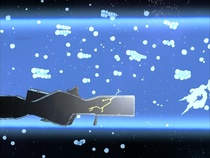
To commemorate the thirtieth anniversary of Kaiser Friedrich's ascension to the throne (a rare feat in the Goldenbaum Dynasty) in December 794 UC (485 IC / 3594 CE), the Galactic Empire announces a large new offensive against the Alliance, partly to distract the Imperial people from his lack of domestic accomplishments. This information is reported to the Alliance government via Fezzan and soon several fleets are deployed to meet this threat. The two sides engaged each other in the historically known Tiamat Starzone in February 795 UC (486 IC / 3595 CE). Reinhard's formation was initially kept in reserve as the battle began, by order of Gregor von Mückenberger. However, the young vice admiral had the opportunity to play a key role when Willem Holland's 11th Fleet charged directly into the Imperial formation, ahead of the other Alliance fleets. Chaos ensued, and Reinhard moved his fleet back, which encouraged Holland to think that the Imperial line was breaking. Orders from Vice Admiral Alexander Bucock of the 5th Fleet to withdraw were ignored by Holland, who pressed the attack. However, the main Imperial body under Mückenberger's command eventually was able to disentangle itself from Holland's 11th Fleet, who by then had megalomaniac visions of invading the Empire himself from there. That gave Reinhard the opportunity to have his fleet launch a concentrated artillery attack at one point in the enemy formation, the center. The 11th Fleet flagship Epimetheus was instantly destroyed, Holland being killed instantly. Another barrage three minutes later broke the remaining 11th Fleet ships into a full retreat. (TBT: 'Part One')
The retreat of the 11th Fleet was covered by their comrades in the 5th and 10th Fleets, however, preventing an effective Imperial pursuit and prompting Reinhard to admire the abilities of the 5th and 10th Fleet commanders. The Empire then withdrew, having achieved a propaganda victory by practically annihilating the Alliance's 11th Fleet. Some dismissed his artillery attack that decided the battle as just luck, but the fact remained that Reinhard's action was decisive in the victory. Thus his promotion to admiral was assured. (TBT: 'Part Two')
Later military career
The Battle of Legnica
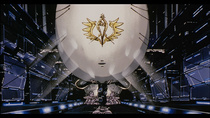
With the victory at the Third Battle of Tiamat, Reinhard was promoted to the Admiralty—becoming the youngest full admiral in the Galactic Empire. As an admiral, Reinhard was given command of a fleet and his own, a one-of-a-kind warship, the Brünhild—the bloodthirsty maiden. It was an experimental battleship, the only one of its class, constructed with advanced technologies that ignored to mass production costs. Among its various upgrades was advanced command and control equipment that allowed Reinhard to direct massive fleets of warships. The vessel did not have to wait long to see its first action, as Imperial Admiral Reinhard von Müsel was ordered to command his expeditionary fleet to Iserlohn. (TBT: 'Part Two'; Fleet File Collection Vol.1R)
Upon arrival to the fortress, Reinhard von Müsel's expeditionary fleet was ordered to intercept an Alliance fleet that had approached the area in further in the Corridor by the commander-in-chief, Fleet Admiral Mückenberger. The recently arrived Imperial reinforcements were exhausted from the long journey to Iserlohn: the order to attack was a transparent attempt to get Reinhard killed: many of the nobility were jealous of Reinhard's favour with the Kaiser, believing he had been granted a command at such a young age solely because of his sister's influence. Reinhard encountered the Alliance fleet into the atmosphere of the planet Legnica, a gas giant in the Tiamat Starzone. In the upper layers of the atmosphere, the ships of both fleets were forced to fight at extremely close-ranges, as sensors and communications were virtually non-functional. Reinhard ordered his fleet to engage the enemy in close combat for several minutes, having each ship fire all of its cannons as frequently as possible. This rapidly energized the upper layer of Legnica's atmosphere, creating a massive wind storm that propelled a great deal of the hydrogen and helium in the atmosphere upward. Reinhard then had his fleet rise up out of the atmosphere, where he then fired a single nuclear missile from the Brünhild to Legnica's core. When the nuclear warhead detonated, it ignited the atmosphere: the Alliance fleet took heavy damage in the ensuing firestorm. (My Conquest Is the Sea of Stars)
Though Reinhard von Müsel had managed to inflict heavy losses on the Alliance fleet with only token losses to his own forces, he was not given proper credit for his victory, as the weather conditions were assumed by his superiors to have been a natural phenomenon and his victory attributed to luck. This further strengthened the perception that Reinhard was an incompetent commander who had only achieved his rank by "hiding under his sister's skirts", further encouraging contempt for him on behalf of the high nobles. (My Conquest Is the Sea of Stars)
The Fourth Battle of Tiamat
The Free Planets Alliance chose to continue with their plans to assault Iserlohn Fortress despite their defeat at Legnica. The Imperial fleets stationed at Iserlohn, under the command of Gregor von Mückenberger, sailed forth to meet the Alliance fleet head on: Reinhard von Müsel's fleet was positioned at the left wing of the formation. Determined to be rid of the "Admiral of the Skirts" once and for all, Mückenberger ordered Reinhard's formation to advance on the Alliance fleets alone as a diversionary measure: the rest of the Imperial Fleet would maintain is position, meaning Reinhard's smaller force would be annihilated by the vastly more numerous Alliance ships. Reinhard complied with the order but staked his survival on a complete gamble. He advanced his fleet toward the enemy formation alone, but rather than open fire on them once he was in range, however, Reinhard had his entire fleet turn ninety degrees to the right. The blond admiral's fleet then slowly moved in front of the Alliance fleet, utterly exposed. Unable to comprehend why an enemy intentionally made itself so vulnerable, the Alliance navy commanders refused to attack Reinhard's forces, believing his maneuver to be some sort of elaborate trick. Their inaction allowed Reinhard to position his forces along the left flank of the Alliance formation. (My Conquest Is the Sea of Stars)
By the time they realized their error, the main Imperial Fleet had entered combat range, forcing the Alliance invasion force to deal with the main Imperial force, ignoring Reinhard's detachment. The Imperial fleet was roughly equal in size to the Alliance fleet, turning the battle into a violent brawl. Understanding he had been outsmarted by the young admiral, Mückenberger refused to ask Reinhard's fleet to attack: Mückenberger believed that he was similarly petty, and would not move to aid the besieged Imperial forces unless ordered to do so. Reinhard, however, realized that the gratitude of the thousands of soldiers whose lives he could save by attacking the Alliance flank far outweighed the ire he would earn from embarrassing Mückenberger. He ordered his fleet to attack, and in moments the Alliance forces were facing a rout. (My Conquest Is the Sea of Stars)
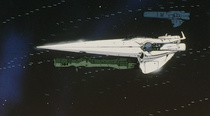
At this point, the Alliance forces decided they had no choice but to retreat. They were determined to launch a diversionary attack directly against Iserlohn Fortress, to draw off the bulk of the Imperial fleet and buy enough time for them to escape. Commodore Yang Wen-li volunteered to lead the diversionary attack: he took a single battleship, the Ulysses, with a skeleton crew along with 4 unmanned cruisers straight for Iserlohn. Using sensor decoys, Yang Wen-li was able to fool the Imperial Fleet into thinking he was leading a fleet of several thousand warships toward the undefended fortress. Mückenberger immediately ordered the fleet to go back to Iserlohn, and taking advantage of this opportunity, the Alliance began to retreat while inflicting additional losses upon the Imperial commander's main force. Fortunately, Reinhard immediately realized the Alliance fleet was a decoy operation, and managed to reveal this fact to Mückenberger. This prompted the Fleet Admiral to resume the attack on the Alliance forces, preventing them from retreating. Determined to save the lives of his fellow soldiers, Yang Wen-li then flew his battleship straight into the heart of the Imperial Fleet. There, he assumed a position immediately beneath the Brünhild, effectively taking Reinhard von Müsel hostage. Reinhard ordered his forces to disregard his own safety and open fire on Yang Wen-li's ship, but they refused, with Captain Karl Robert Steinmetz saying that as the captain of the flagship he would not put it into unnecessary danger, a statement that Reinhard accepted. Mückenberger also did not fire, unwilling to risk the political damage of directly killing the brother of Kaiser Friedrich's favored concubine. Both the Imperial and Alliance fleets held fire on each other until they had passed, at which point Yang left the battlefield, monitored by Reinhard. (My Conquest Is the Sea of Stars)
After the Fourth Battle of Tiamat, Reinhard was promoted to High Admiral, and firmly established a reputation for himself as a brilliant tactician because of his actions during the engagement. Furthermore, Reinhard went to lengths to learn the name of the Alliance officer who had managed to open up a path to safety for the retreating Alliance forces, while at the same time Yang Wen-li had sought out the name of the commander of the white ship. From this point on, the rivalry with Yang Wen-li would help to define Reinhard's life. (My Conquest Is the Sea of Stars)
Astarte and other developments
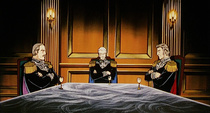
Having secured a reputation as a skilled military officer at Tiamat, Reinhard receives a hero's welcome at the Imperial City on Odin, where he is promoted to high admiral and is formally granted the title of Count von Lohengramm by His Majesty the Kaiser. Although he did not expect to be deployed any time soon, the scheming of Duke Otto von Braunschweig, the most powerful aristocrat in the Empire, and other high nobles—who by that point had no choice but to acknowledge the young high admiral and despised him—resulted in the High Command Office deciding to send him back to the front. Not only that, but as he found out, most of his top officers in the Lohengramm Fleet (including chief of staff Ernest Mecklinger, fleet commanders Oskar von Reuenthal and Wolfgang Mittermeyer, and even the Brünhild's captain Steinmetz) were to be temporarily replaced by other commanders that he had not worked with for this operation. Although Kircheis was unenthusiastic, Reinhard was glad and saw it as an opportunity to gain even more accolades for advancement. He was ordered to lead a fleet of 20,000 vessels to invade Alliance space. However, the details were leaked by Duke von Braunschweig via Fezzani leader Adrian Rubinsky to the Alliance government, and they dispatched the 2nd Fleet, 4th Fleet, and 6th Fleet to counter him. (Overture to a New War)
The fleet under Reinhard advanced towards the Astarte Starzone. The three Alliance fleets were divided and intended to attack the Imperial force from three sides, encircling the enemy formation in a repeat of the historical Battle of Dagon, around 156 years earlier. Since the three different fleets, while greater in total number, were weaker than Reinhard's force on an individual level, he decided to speed up and annihilate each one of them individually before they could meet up. This resulted in the near-total destruction of the 4th and 6th Fleets before he attacked the 2nd Fleet, where the actions of Yang Wen-li, who took command upon Vice Admiral Paetta becoming injured, prevented it from suffering the same fate as its comrades. Nonetheless, the Battle of Astarte ended as an overwhelming Imperial victory despite the overall numerical inferiority of Reinhard's forces. Shortly after this victory he was promoted to rank of Fleet Admiral, an unprecedented achievement for someone of his age, and was made Vice Commander of the Imperial Space Fleet. In this position he commanded around a third of the fleets in the Empire, and after the fall of Iserlohn Fortress, he was put in charge of the war front on the Imperial side of the Iserlohn Corridor. Reinhard was also granted his own admiralty, and selected talented individuals he had encountered over his previous military service to staff his new command. These individuals had previously been in low ranking positions, with their talents and initiative unrecognized and unappreciated by hierarchical and largely highborn senior officers. (LOGH: 'In the Eternal Night', 'The Battle of Astarte', 'Empire's Afterglow', 'The Castrop Rebellion', 'The Actress Exits', Overture to a New War)

Shortly afterwards, Reinhard assigned his friend Kircheis (who was a rear admiral at the time) to lead the effort in suppressing the Castrop Rebellion. The Emperor had ordered the blond admiral to requisition Maximilian von Castrop's wealth, stolen from the Imperial state, and to quell the noble's revolt. Reinhard made the decision to send Kircheis in his place so that he could gain his own accolades, to establish a reputation as a skilled tactician in his own right. The two developed a strategy to destroy Castrop's main defensive weapon, the Artemis Necklace (thought to be impregnable), which was to utilize a directional Seffle particle generator. The ploy worked, and upon the loss of the Necklace, Castrop's subordinates murdered him out of fear of Imperial reprisal. That way the "impregnable" planet was freed by Kircheis' work without the loss of a single life besides Castrop's, increasing his reputation as more than just Reinhard's shadow and joining the ranks of the vice admirals of the Lohengramm admiralty. Kircheis expressed disappointment to Reinhard at the death of the noble, to which Reinhard replied that he considered Kircheis to be a "good man." (LOGH: 'The Castrop Rebellion')
After the Seventh Battle of Iserlohn (which occurred about five months after the victory at Astarte) and the loss of Iserlohn Fortress to the Alliance, the three Imperial Chiefs of Staff sought to resign from their positions: it was obvious that one of the vacancies would be given to Reinhard. Instead, when Kaiser Friedrich IV gave Reinhard the choice of any of the three vacant seats, Reinhard begged the Kaiser not to dismiss any of the Chiefs of Staff, urging him to be lenient: those responsible for the defeat had already been punished by their own actions. The minister of state and acting Imperial premier, Klaus von Lichtenlade, agreed with Reinhard (taken aback by the young admiral's decision), and Friedrich IV determined not to punish anyone for the loss of the fortress. In return for Reinhard's unexpected intercession on their behalf the three Imperial Chiefs of Staff dropped any attempts to punish Paul von Oberstein, a staff officer of the Iserlohn Stationed Fleet who had escaped the fall of the fortress, and whom Reinhard then took on as an advisor. (LOGH: 'Cool, Clear Artificial Eyes')
Alliance invasion of the Empire
When Yang Wen-li captured Iserlohn Fortress, he hoped that the Free Planets Alliance, whose economy was in shambles after more than a century of continual warfare, would seek an equitable peace treaty. Instead, the ruling High Council of the Alliance, motivated by political gain, and some overly ambitious junior officers under Andrew Falk who sought personal advancement, saw an opportunity to strike into the heart of the Empire and to 'liberate' the people of the Galactic Empire from their oppressors. As Vice Commander of the Imperial Fleet, Fleet Admiral Reinhard von Lohengramm was tasked with the defense of the Empire by Emperor Friedrich. At the counsel of his advisor, Paul von Oberstein, Reinhard pursued a "scorched earth" strategy. Rather than engage the invading Alliance fleets directly, he had Imperial warships remove all supplies from every world in the immediate path of the Alliance force, leaving the people to rely on the Alliance "liberators" to feed them. Because he knew the Alliance invasion hinged upon the idea of liberating the peasants from the Kaiser's rule, Reinhard correctly calculated that the Alliance occupation forces would need to feed the civilians—thus creating a strained and long line of supply from Iserlohn. Once this supply line was attacked and severed by High Admiral Siegfried Kircheis, the invading Alliance troops soon found themselves to be under-supplied and starving along with the Imperial civilians. The people of the occupied planets, though initially thankful for the liberation, soon turned on the occupying Alliance forces who had resorted to confiscating food from the civilians. (LOGH: 'Invasion of the Imperial Territory', 'When the Rain of Grief Comes...', 'Liberation of the Frontier Zone', 'The Battle of Amritsar Starzone')
And as the scattered Alliance fleets, suffering from the lack of supplies and a drop in morale, reached the height of their fatigue, the Imperial Navy launched its counteroffensive. Although many of their commanders realized there was no chance of winning, they attempted to make a stand, but ultimately suffered heavy losses before succumbing to Reinhard's stratagem. However, due to the speed and swiftness of these attacks, only three of the Alliance fleets were able to maintain combat capability (Yang's 13th, Bucock's 5th, and Appleton's 8th), the others all being destroyed, severely diminished, or having surrendered. Meanwhile, the commander-in-chief of the Alliance expeditionary force, Fleet Admiral Lassalle Lobos, unwilling to relinquish his gains or admit defeat in the invasion, ordered all remaining forces to gather at the Amritsar Starzone in an attempt battle the combined Imperial Fleet directly en masse. Reinhard was more than willing to oblige. At the Battle of Amritsar, Reinhard personally led the obliteration of the Free Planets Alliance invasion force. After the loss of much of the 8th and 5th Fleets, the 13th Fleet and the surviving remnants of the others managed to withdraw due to Yang's tactics and cooperation with Bucock. Despite the Empire's ultimate victory, Reinhard was nonetheless frustrated with Yang being able to prevent him from achieving "total victory" over the remaining Alliance forces. (LOGH: 'The Battle of Amritsar Starzone')
Following their disastrous defeat, the devastated Alliance forces withdrew to Iserlohn Fortress with Yang's 13th Fleet remaining the only combat capable formation out of those that had taken part in the invasion. The Alliance navy had lost around two-thirds of its military strength, over twenty million troops. However, any thought of celebration in the Empire was quickly muted by a surprising development: the death of the Emperor from a heart attack. (LOGH: 'The Battle of Amritsar Starzone', 'New Trends')
The Imperial Civil War
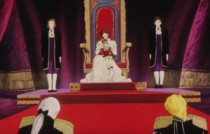
No sooner had the Free Planets Alliance been routed at Amritsar, did Reinhard learn that Kaiser Friedrich IV had died peacefully in his sleep, thus robbing Reinhard of his vengeance. There was no official heir-apparent since Crown Prince Ludwig's death some years ago, thus it was inevitable that a struggle would occur over the throne between the Kaiser's immediate grandchildren: Elisabeth von Braunschweig, Sabine von Littenheim, and Erwin Josef von Goldenbaum. The first two hailed from the two most powerful aristocratic families in the Empire, while Erwin Josef (five years old at the time) was the son of the deceased Crown Prince. Kaiser Friedrich's former minister of state and prime minister, Klaus von Lichtenlade, wanted to see the boy on the throne in order to be able to use him, rather than let either Otto von Braunschweig or Wilhelm von Littenheim take his position. Thus he sought Reinhard's assistance, as being a civil servant he had no military forces of his own. The young admiral foresaw this and chose to support Lichtenlade, although both harbored no illusions that they were merely using each other. Lichtenlade became the Imperial regent and elevated his peerage to Duke, while Reinhard gained the title of Marquis. (LOGH: 'New Trends')
Meanwhile, many of the high nobles saw this as a blatant attempt by Reinhard and Lichtenlade to usurp the Imperial throne from the Goldenbaum family, the final straw in what they saw as Reinhard's treason against the dynasty. These reactionary nobles, led by Duke von Braunschweig and Marquis von Littenheim, rallied and created their own organization to counter the influence of the Lohengramm–Lichtenlade axis and defend the old order, becoming known as the Lippstadt League. Their combined arms and wealth were greater than those of the central government, and so Reinhard struck preemptively in an attempt to pacify them. While they did seize control of government buildings and arrested some high nobles, the majority managed to escape, including Braunschweig and Littenheim. They gathered on Geiersburg Fortress, their new headquarters, and named the renowned Imperial High Admiral Willibald Joachim von Merkatz as the commander-in-chief of the Lippstadt allied forces. As they were revolting against the child Kaiser, Reinhard had the nobles named the "Rebel Forces" in official documents, the same name that the Empire had used to refer to the Free Planets Alliance ever since the Battle of Dagon over 150 years earlier. Lichtenlade's government named Reinhard von Lohengramm the holder of all three offices of the Imperial Chiefs of Staff simultaneously, making him the Imperial Fleet Supreme Commander. (LOGH: 'New Trends', 'The Lippstadt Conspiracy')

Reinhard himself oversaw the main operation against Geiersburg Fortress, while leaving his friend High Admiral Kircheis to pacify the noble-controlled frontier and other sectors. Under his command, the loyalist Imperial forces were able to drive the Lippstadt fleet back towards Geiersburg in the Freya Starzone, where the high nobles took refuge in the fortress. Eventually, they left and attempted to break the siege multiple times, only to be beaten back. However, the Imperial Fleet's success over the numerically superior Lippstadt forces led to the nobles becoming increasingly aggravated. Whena revolt occurred on the planet Westerland and the local lord, a relative of Duke von Braunschweig, was murdered by his subjects, he ordered a nuclear strike on the planet. The Duke ignored the advice of his commanders and the attack was launched. Reinhard initially wanted to intercept it, but procrastinated in making a final decision as Oberstein wanted to let it go ahead and use it for propaganda purposes against the nobles. Oberstein did not tell Reinhard the correct time in which the attack would reach the planet, and it happened before he made a decision. A reconnaissance ship documented the massacre and the images were beamed throughout the Empire, eliminating any of the popular support that the Lippstadt League might of had. However, the fact that Reinhard essentially played a role in this tragedy would haunt him for the rest of his life. (LOGH: 'Bloodshed in Space', 'Courage and Loyalty', 'Roses at Summer's End')
Not long after that, the nobles in Geiersburg became increasingly depressed while the fortress garrison became restless and began to rebel. Braunschweig decided to lead his forces in a final charge against the enemy, only for it to be routed. After he arrived at the fortress, a mass mutiny broke out among the troops and the Duke himself was forced to commit suicide by his chief retainer, Commodore Ansbach. Reinhard then arrived triumphantly at Geiersburg as the final resistance had ceased. However, when Ansbach presented the Duke's body to the victorious Reinhard, he pulled out a hidden weapon from within Braunschweig's corpse and attempted to fire at the young admiral. Siegfried Kircheis immediately attempted to shield Reinhard, and was killed as a result. Reinhard went into a inconsolable depression, and refused to see anyone. Seeing this, his admirals decided to take matters into their own hands. At the advice of Paul von Oberstein, both the assassination attempt and the murder of Kircheis were blamed on the Imperial Regent, Klaus von Lichtenlade. Reinhard's subordinates subsequently sent their fleets to the capital, Odin, to arrest Lichtenlade. (LOGH: 'The Fall of Goldenbaum', 'The Day Before Destiny', 'Farewell, Distant Memories')
As Reinhard remained on Geiersburg, the Imperial fleets landed on Odin and seized control of the capital. Lichtenlade was arrested and forced to commit suicide, while the Imperial Seal was retrieved and transferred to Reinhard himself, thereby firmly established his new and total authority over the Empire. However, this victory was blackened by the death of Kircheis and the subsequent decision by his sister Annerose into withdrawing into seclusion on Odin, feeling guilty over her brother's friend's death. His remark to Oskar von Reuenthal over the fate of the defeated Lichtenlade's family, that he could also try challenging him if he felt he could do it, would also be the beginning of an emotional crisis in Reuenthal that would see its conclusion years later in a dramatic fashion. (LOGH: 'Farewell, Distant Memories')
Prime minister
Reforming the Reich
With the fall of both Lichtenlade and the high nobles, Reinhard was left as the single most powerful figure in the country, and after being appointed Prime Minister of the Galactic Empire, Reinhard set about implementing drastic reforms. He received help from reformist nobles such as Hildegarde von Mariendorf, Eugen Richter, and Karl Braque, the latter two being cabinet ministers who gave up their noble titles to serve Reinhard. The child Emperor Erwin Josef II was not a threat and was essentially a puppet, and thus Prime Minister Duke von Lohengramm became the de facto dictator of the Empire. Among those reforms he instituted early on, starting in January 798 UC (489 IC / 3598 CE), were nationalizing the wealth of the defeated high nobles, which alleviated the Empire's economic problems in a single decision, as well as abolishing the traditional class system itself—much to the support of the common people. The promotion of civil liberties and other rights that would have been unthinkable just a couple of years ago became the new norm. Although the Goldenbaum Dynasty de jure remained in power in name, its foundations were effectively being swept away. However, despite his success in seizing control of the Empire, Reinhard continued to suffer an emotional crisis over the death of Kircheis and the withdrawal of his sister Annerose into seclusion as a result of Kircheis' death. (LOGH: 'First Battle')
However, during this early period of reform, the Lohengramm government became entangled in the plots of the Fezzani autonomous region leader, Adrian Rubinsky. Seeing that the Empire had been strengthened by its civil war while the one in the Alliance had weakened it, he decided to allow the Empire to conquer the devastated Alliance so that Fezzan could seize control of this new regime. To that effect, their first plan was to pitch the idea of putting warp-capable engines on Geiersburg Fortress and using it to attack Iserlohn, sending the information regarding that plan to the Imperial Fleet's science and technology inspector general, Admiral Anton Hilmer von Schaft. Schaft proposed the plan and it was accepted by Reinhard, but not with much enthusiasm, as the public and the Imperial leadership were largely not in favor of any more war and would rather have a period of rebuilding. Nonetheless, Reinhard authorized the plan to mobilize Geiersburg Fortress to Iserlohn, and the testing the new engines was successful on 18 March 798 UC (489 IC / 3598 CE). At the same time, unbeknownst to Reinhard or the Empire, the Fezzanis had gone to work in arranging that Yang Wen-li, who had been appointed as commander-in-chief, Iserlohn, was summoned by the Alliance government away from the fortress before the Imperial attack. After Reinhard gave the order, Geiersburg entered the Iserlohn Corridor on April 10. (LOGH: 'Portraits', 'One Narrow Thread', 'Lost Things', 'The Inquiry Committee')
Even as the Geiersburg deployment was playing out, the Fezzanis hatched yet another scheme to keep the Alliance and Empire from realizing that they could coexist and make it inevitable that one had to destroy the other. As part of this scheme, two former Lippstadt League veterans who were living in exile on Fezzan, Count Alfred von Landsberg and Captain Leopold Schumacher, were hired by Rubinsky's aide Rupert Kesserling to kidnap the child Emperor and bring him to the Alliance, where they would set up a "legitimate" government-in-exile with the other high nobles. Ultimately, the Iserlohn garrison was able to hold out without Yang, and he eventually returned. At that point, the combined Alliance forces were able to defeat the Imperial invaders and destroy Geiersburg. This defeat enraged Reinhard, who had not expected Karl Gustav Kempff to lose 90% of his forces in this attempt. The young Imperial dictator had appointed Kempff to the position of Geiersburg commander, but had remarked he was the kind of admiral who was no longer useful if he lived too long. Although he outwardly mourned the demise of Kempff, it still made one of his chief retainers, High Admiral Oskar von Reuenthal, uneasy, and set the early seeds of what would manifest itself years later. But Reinhard remembered Kircheis, and how he would have urged restraint on Reinhard's part, and thus decided not to punish Kempff's returning second-in-command, Neidhart Müller. (LOGH: 'One Narrow Thread', 'Lost Things', 'Fortress vs Fortress', 'Determination and Ambition')
The Emperor's Abduction
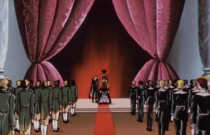
With the loss of the Geiersburg Fortress and the Kempff Fleet last spring, the Imperial public was largely against the idea of any further extended warfare, to Reinhard's annoyance. But the Fezzani plan that had been put in motion would culminate during the summer of 798 UC (489 IC / 3598 CE) and make another confrontation inevitable. In June, the Prime Minister is informed by the Military Police chief Ulrich Kesler that Landsberg and Schumacher arrived on the Imperial capital with Fezzani passports. He orders them to be tracked and after some discussions with his secretary, Hildegarde von Mariendorf, he summons Fezzan's ambassador on Odin, Nicholas Boltik. Reinhard deduced the essence of the Fezzani plot to kidnap the child Kaiser, and essentially made a deal to go along with their plan to help him conquer the Alliance, with the kidnapping and the government-in-exile that would be created providing the necessary casus belli. Both men left the discussion being convinced that they were successfully using each other, although Boltik did not surmise the extent of Reinhard's own plan, which was to use the demilitarized Fezzan Corridor to take the Alliance by surprise and avoid attacking Iserlohn. Boltik said he would ask his government about it, but Reinhard secretly made up his mind to seize control of it forcefully. (LOGH: 'Thunder')
Because of this, Reinhard basically permitted Landsberg and Schumacher to go ahead and kidnap the Emperor. On the night of July 6–7, the two Lippstadt veterans carry out their plan and kidnap Erwin Josef II from his palace. Fezzan arranged for them to be taken by a smuggler through the Fezzan Corridor to the Alliance, where they used their influence to make sure the Alliance government under Job Trunicht went along with their plan. Meanwhile, the young Imperial leader declared a state of emergency and convened a meeting of the High Command, in which he told his admirals to place their fleets into immediate combat readiness. Later, a broadcast from the Alliance reveals the composition of the new "Galactic Empire Legitimate Government" under the Kaiser and led by premier Jochen von Remscheid, a high noble Lippstadt supporter and former Imperial high commissioner to Fezzan. On August 20, Reinhard officially confirmed the kidnapping of Erwin Josef II and denounced the Alliance government for its responsibility in this matter, thus essentially declaring war. (LOGH: 'Thunder', 'The Abduction of the Young Emperor', 'The Arrow Is Released')
On September 20, Reinhard von Lohengramm proclaimed the abdication of the kidnapped Erwin Josef II, and named Catherine von Goldenbaum as his successor on the throne, making her the Empire's first Kaiserin and the last Goldenbaum monarch. (LOGH: 'Operation: Ragnarök')
Operation Ragnarök: Fall of the Alliance
On the same day Catherine I was put on the throne, Admiral Oskar von Reuenthal led a fleet to attack Iserlohn Fortress. The attack served its purpose, to distract the Alliance leadership, while the bulk of Reinhard von Lohengramm's fleets invaded the Alliance through the Fezzan Corridor. In mid-January of 799 UC (1 NIC / 490 IC / 3599 CE), Admiral Wolfgang Mittermeyer, the Gale Wolf, successfully invaded and occupied the Dominion of Fezzan. Once the planet was firmly under the control of Mittermeyer's forces, the rest of Reinhard's fleets entered Fezzan space. When Reinhard von Lohengramm disembarked the Brünhild on Fezzan's surface, he was met by the loud cheering of tens of thousands, all chanting, 'Sieg mein Kaiser! Sieg Kaiser Reinhard!' (LOGH: 'Fezzan Occupied')
Using Fezzan as a base, Reinhard led an invasion of Alliance with several fleets. They enjoyed initial successes until Yang Wen-li's Iserlohn Garrison Fleet abandoned Iserlohn to oppose him. Both Yang and Reinhard realised that with the massive numerical advantage held by the Imperial fleets it would not be possible for the Alliance to force him to withdraw. Yang therefore adopted a strategy of menacing the Imperial supply lines and advance forces, engaging Reinhard's admirals in isolation while avoiding action with Reinhard's main fleet.
The Battle of Vermilion
The Alliance hoped that that Reinhard's death could cause the Galactic Empire to fragment into another civil war and knowing this, Reinhard dispersed his admirals, keeping only a relatively small fleet with himself in the Vermilion starzone. He hoped that by using himself as bait he would draw Yang into an open confrontation. This strategy succeeded, but Yang was able to dominate the battle despite Reinhard's attrition tactics. Even the arrival of Neidhart Müller's fleet as reinforcements did not turn the tide. However, with the Brünhild under Yang's guns, the Yang Fleet abruptly surrendered, having received news that the fleets of Mittermeyer and Reuenthal had seized Heinessen in a sudden attack, forcing the High Council of the Alliance to surrender. Though Reinhard gained the strategic victory through the actions of his subordinates, the Battle of Vermilion would be the only battle Reinhard ever lost. (LOGH: 'The Battle of Vermilion (Part One)', 'The Battle of Vermilion (Part Two)', 'Sudden Change')
New Galactic Empire
Coronation
With the Alliance government now under Imperial supervision, Reinhard returned to Odin where Kaiserin Katharin Kätchen's regent signed an abdication on her behalf, bringing the reign of the Goldenbaum dynasty to an end and opening the way for Reinhard to be crowned as Kaiser of the New Galactic Empire. (LOGH: 'Long Live the Emperor!')
War with Earth
In the first months of his reign, Kaiser Reinhard accepted an invitation from his chief secretary, Hildegard von Mariendorf, to dine with her sickly cousin, Baron Heinrich von Kümmel. Shortly after the meal began, Kümmel revealed that the Reinhard's table lay above a large subterranean vault, filled with highly volatile Seffle particles. Kümmel revealed a detonator switch, declared his intention to assassinate the Reinhard, and demanded the Kaiser's undivided attention.
While Reinhard was held hostage at the Kümmel Estate, the former Supreme Chairman of the Free Planets Alliance, Job Trunicht, now serving in a minor position within the Imperial government, approached High Admiral Ulrich Kesler, the head of the Military Police, and told him of a Terraist plot to assassinate the Kaiser. This information proved to be true, and allowed the Military Police to deploy much sooner than Kümmel and the Terraists had predicted. The Terraists on Odin were immediately killed or captured as part of Kesler's sweep.
By the time that Kümmel was losing his patience and angrily demanding things of the Kaiser, demands to which Reinhard confidently then hotly shot back refusals, the Military Police has completely surrounded the courtyard where the meal turned incident was taking place. Upon Kümmel's request to hold the Kaiser's locket, Reinhard's temper flared resulting in him slapping away Kümmel's reach. Immediately, Commodore Günther Kisling dove and tackled Kümmel, knocking the detonator free and mortally wounding the frail man in the process. The Military Police and Imperial Guard both then rushed into the courtyard, securing Reinhard and removing him from danger. (LOGH: 'The Kümmel Incident')
In response to this attempt on the Kaiser's life, High Admiral August Samuel Wahlen was sent to Terra to destroy Terraism's main base. Although being wounded by a zealot, he was able to carry out his mission with relative ease with help provided by Julian Mintz and his companions. Seeing their dire situation, the Terraist employed mass suicide and attempted to destroy their own base with the Imperials still inside. Terraism was destroyed as a major religion and power, and was regulated to scheming in small groups from then on. While their were some Imperial casualties, they were relatively light, and Wahlen's mission was considered a success. (LOGH: 'Visitors', 'Holy Land')
Ragnarök again
....
The Battle of the Corridor
....
The Iserlohn Republic
Reinhard's relationship with the Iserlohn Republic was a complicated one. Upset over the loss of the fortress to Yang Wen-li, Reinhard resolved to re-take it but other matters demanded his attention first. When he could finally turn his attention to military matters, he launched a major expedition, resulting in the Battle of the Corridor. The lengthy battle saw Yang's heavily outnumbered forces first defeat Reinhard's vanguard then fight Reinhard's main force to a stalemate. Reinhard collapsed as a result of exhaustion, and while both exhausted forces pulled back to rest and regroup, Reinhard claimed to have seen a vision of Kircheis, telling him to be a friend to his constant rival. However, Yang did not make it to the offered peace talks. The loss of his rival drove any wish to conquer Iserlohn from his mind as it had really been the desire to fight Yang that had motivated Reinhard. Yang's followers established the Iserlohn Republic as a continuation of Yang's ideals. Reinhard did not recognise the existence of the Republic but did not make any immediate moves to attack it. Though Yang had proven himself worthy of Reinhard's respect and thus worthy of discussing peace with, he did not immediately view the rest of Yang's followers or his successor, Julian Mintz, as having done so. It was not until after the Reuenthal's Revolt and after the Republic's defeat of the Empire at the Eleventh Battle of Iserlohn, that Reinhard rose to the Republic's challenge to his authority. The final Battle of Shiva saw the face to face meeting of Reinhard and Julian Julian Mintz, and an armistice. In return for the return of Iserlohn fortress and the dissolving of the Iserlohn Republic, Reinhard consented to the Ba‘alat Starzone, including the planet Heinessen, being made an internally self-governing autonomous zone. (LOGH: 'Disappointing Victory', 'The Crimson Star Road', 'The Beautiful Maiden Wants Blood', 'The Golden Lion Flag Loses Its Lustre')
Reuenthal's Revolt
...
Death

Frequently bedridden from fatigue and exhaustion in the days following the Battle of the Corridor, Reinhard was eventually diagnosed with a heretofore undiscovered, degenerative disease. Labelled the ' Emperor's Sickness', this malady took Reinhard's life at the age of 25. Reinhard von Lohengramm, first Emperor of the New Galactic Empire, died on 26 July 801 UC (3 NIC / 492 IC / 3601 CE). Upon his death, Hildegard von Mariendorf assumed rule over the Empire as Regent. (LOGH: 'Dream: To See It to the End')
Legacy
Reinhard's life was characterized by a strong sense of justice and personal responsibility. By his own efforts, he claimed dominion over the galaxy. His enduring wish was to see his Empire ruled not by blood but by merit, even if it meant the end of his dynasty. Reinhard may have been the perfect autocrat, but the abilities and personalities of his successors was unknown, paralleling the situation after Rudolf von Goldenbaum had founded the Empire. Given the groundwork he laid, however, and the moderate influences of his wife, supported by Fleet Admiral Mittermeyer, and the concessions to autonomy for the Ba‘alat Starzone and more representative rule in the whole Empire, it was probable the transition to the early years of the post-Reinhard Empire was reasonably smooth.
Personal life
Appendices
Appearances
- My Conquest Is the Sea of Stars (first appearance)
- LOGH:
(46)
- 'In the Eternal Night'
- 'The Battle of Astarte'
- 'Empire's Afterglow'
- 'The Castrop Rebellion'
- 'Cool, Clear Artificial Eyes'
- 'The Klopstock Incident'
- 'The Actress Exits'
- 'When the Rain of Grief Comes...'
- 'Liberation of the Frontier Zone'
- 'The Battle of Amritsar Starzone'
- 'New Trends'
- 'Before the Storm'
- 'The Lippstadt Conspiracy'
- 'The Yang Fleet Goes Out'
- 'Bloodshed in Space'
- 'Courage and Loyalty'
- 'The Fall of Goldenbaum'
- 'The Day Before Destiny'
- 'Farewell, Distant Memories'
- 'First Battle'
- 'Portraits'
- 'One Narrow Thread'
- 'Lost Things'
- 'The Inquiry Committee' (???)
- 'Fortress vs Fortress' (flashback)
- 'The Return'
- 'Determination and Ambition'
- 'Thunder'
- 'The Abduction of the Young Emperor'
- 'The Arrow Is Released'
- 'Operation: Ragnarök'
- 'Invitation to a Requiem'
- 'Fezzan Occupied'
- 'The Cold Spell Arrives'
- 'Admiral Yang's Ark Fleet'
- 'Seeking a Free Universe'
- 'The Two-Headed Snake: The Battle of Rantemario'
- 'The Darkness Before Dawn'
- 'Battle After Battle'
- 'The Battle of Vermilion (Part One)'
- 'The Battle of Vermilion (Part Two)'
- 'Sudden Change'
- 'Long Live the Emperor!'
- 'The Beautiful Maiden Wants Blood'
- 'The Golden Lion Flag Loses Its Lustre'
- 'Dream: To See It to the End' (death)
- Golden Wings
- Overture to a New War
- SWV:
(4)
- 'Chapter I'
- 'Chapter II'
- 'Chapter III'
- 'Chapter IV'
- RET:
(4)
- 'Chapter I'
- 'Chapter II'
- 'Chapter III'
- 'Chapter IV'
Memorable quotes
- In any age,in any society,when people are small,they look up at the stars and stretch out their hands as if to grasp them.Then at last,they learn that their own arms aren't long enough to reach the stars.They call that becoming an adult. But I don't think so. Without fail,those stars will be in this hand!
- There is great satisfaction in fighting for the sake of gaining power, but it is joyless to fight for the sake of maintaining it. (LOGH: 'The Kümmel Incident')
- These idiots. What do they think of others? They think they are born with the right to rule. They think they have the right to hurt others. These people are too evil. And this empire is too corrupted.
- I want victory — but not because the enemy is weak.
- It's power. What I need is power. If I should want to get my sister back, then I must first, first of all, possess power that would make those idiots bow to my command. If my enemies are to be the aristocracy, then I need a power greater than theirs. If the emperor is to be my enemy, I must be mightier than even him.
- For those who have come to power, wealth and glory not by their own strength and effort, but simply through inheritance, what right do they have to complain? The very existence of such blood-lineage dynasties is disgusting. Power is the property of one generation. It shouldn't be transferred, it should be seized.
- The man who succeeds me must have talent equal to, or greater than my own.
- Genes determine everything? What nonsense. Hereditary physical qualities have no effect on people, that's for individuals. Heredity concerns family background, not personal abilities. Those who blindly believe in such theories generally having nothing in their own lives to be proud of... they are the people I despise the most.
- Indeed, small acts of opposition cannot solve every problem. Our society needs a complete revolution. Such problems must be corrected, and we must not wait for others to correct them. We must carry out the revolution with our own hands.
- If the enemy has anyone with even a tenth of my intelligence, even Iserlohn will fall.
- Our future battles will not only be on the battlefield. Political struggles, court politics. It's not just a war of words, but also a war of blood.
- It's to be expected that incompetent rulers be overthrown.
- Fighting 100 battles does not mean winning 100 victories.
- Already, I have nothing to lose. But even so, I will fight. To keep my promise to you, and... to gain something to quench the thirst in my heart.
- What criminals need is neither diplomacy nor persuasion. They have neither the ability nor the intention to understand. Only force will enlighten their foolishness.
- I aim to be the supreme ruler... and to reach that goal, I have a policy of my own. It is to fight my own battles. That's the difference between myself and the noblemen I've fought and defeated. That's also the reason why the soldiers follow me.
- I cannot lose to anyone. People admire and stay loyal to me because I'm undefeated. I'm not supported because of my bloodline.
- Something that is supposed to die and does not... will eventually rot away, whether it's a man or a nation.
- I don't believe that absolute truth is necessary. I only need the power to freely accomplish my dreams. One could say that it's the power not to have to take orders from those one despises.
- I formally acknowledge that terrorists have abducted his majesty, the Kaiser Erwin Josef. The whereabouts of his majesty, as well as of the lawless criminals who abducted him have both become clear. This band of criminals are former high nobles led by a former Imperial High Commissioner to Fezzan, Jochen von Remscheid, a Count under the old system. These villains, hiding among the rebels who call themselves the Free Planets Alliance, have illegally announced the establishment of a government-in-exile. I hereby declare: having abducted the Kaiser by illegal and cowardly means, the remnants of the high nobility who plan to reverse the flow of history and steal by force the rights that the people have established will receive a suitable repayment for this atrocity. The ambitious men of the Free Planets Alliance who had illicit dealings with them, and who also plot a rebellious war against the peace and harmony of space, will meet the same fate. Their mistaken choice must be met with an appropriate punishment. What criminals need is neither diplomacy nor persuasion, they have neither the ability nor the intention to understand either. Only force will enlighten their foolishness. Hereafter, no matter how great the volume of blood that comes to be shed, bear in mind these foolish criminals and conspirators and know that they are responsible.
- But even if my sister hates me, I can't turn back. If I retreat now from the road to leadership, who will restore the universe to unity and harmony? Shall I entrust the future of humanity to the high noble prodigals who care only about their own lineage? Or to demagogues who just move armies guided by sophistry and profit?
- What do they think people are? Assuming it's a matter of course to rule over them. Stealing from people and insulting people... yet they say it's their privilege to be forgiven?! Those people are corrupt! This empire is corrupt!
- I don't think I can forgive Rudolf and what he did, becoming Kaiser. He set up the people who flattered him as nobles, and the result of that is this disgrace. Haven't you had thoughts like this, Kircheis? The Goldenbaum dynasty, as with the birth of the human race, need not have happened. It's only been 500 years since Rudolf built it. Before that, neither the Empire nor the Goldenbaum family existed, and he was no more than one citizen. Originally, Rudolf was no more than an upstart man of ambition, and who, riding the current of the times, was made into a sacred, inviolable Kaiser.
- Kircheis, do you think what was possible for Rudolf is impossible for me?
Background information
- The name Reinhard is of old Nordic origin and means pure and sturdy. In German, it roughly translates into determined. Both attributes denoting to Reinhard's character as well as his ulterior motives and goals. Lohengramm is quite likely a mistranslation/misspelling of Lohengrin, the opera of Richard Wagner about the grail-knight of the same name.
- Many of Reinhard's achievements and characteristics mirror those of Alexander the Great. Both men were military geniuses who ascended to power at a very young age. Both men conquered most of their respective known universes. Both men were responsible for sweeping social and political reforms that would impact all of human history to follow, and both men died at a young age shortly after their wars had ended. Reinhard's very close friendship with also Siegfried Kircheis parallels Alexander's relationship with his friend and general, Hephaestion.
- Reinhard's life is also similar to that of Julius Caesar. Like Caesar, Reinhard's power stemmed not just from the military, but from the common people. Like Caesar, Reinhard was very popular with the lowest-classes of citizenry and feared by the ruling nobility. Like Caesar, Reinhard seized power through ostensibly legitimate means and stripped the ruling elite of their power, money, and influence. The scene of fleets loyal to Reinhard descending over Odin — of warships appearing over sacrosanct skies — also mirrors that of the 13th Legion crossing the Rubicon into Rome.
- Reinhard also bears many similarities to Rome's first Emperor, Augustus. Like Augustus, Reinhard enacted many reforms that completely changed the social, political, legal and educational landscape of the Empire, and like Augustus, Reinhard focused on crafting a system of Empire that could survive in spite of, or despite, whomever might become Emperor after his death.
- Though its exact symptoms were never explicitly stated, the disease that ended Reinhard's death bore the name "Emperor's Sickness," a term that has been used commonly to refer to Hemophilia and Porphyria, as illnesses infamous for afflicting regal heads-of-state.
- Reinhard's voice actor, Horikawa Ryō, is also notable for his other big anime role: Vegeta, in the mega-hit anime Dragonball Z, its sequel Dragonball GT, and the many affiliated OVAs and movies.
| [hide]v•d•e | |
|---|---|
| Monarchs | Reinhard • Alec |
| Regent | Hildegard |
| Cabinet officials | Bernheim • Karl Braque • Bruckdorf • Mainhof • Franz von Mariendorf • Paul von Oberstein • Osmayer • Eugen Richter • Seeferd • Bruno von Silberberch |
| [show]v•d•e |
|---|
| [show]v•d•e |
|---|


